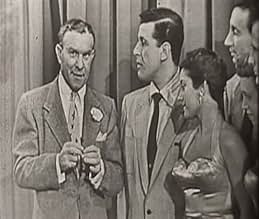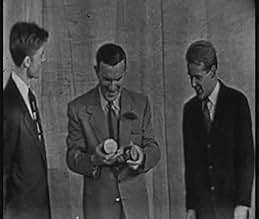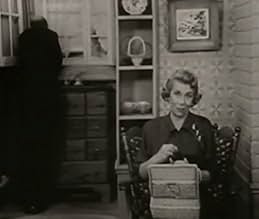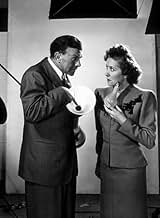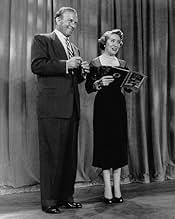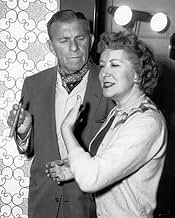The George Burns and Gracie Allen Show
- Serie de TV
- 1950–1958
- 30min
PUNTUACIÓN EN IMDb
8,6/10
1,6 mil
TU PUNTUACIÓN
La vecina Blanche Morton se escapa a menudo con Gracie, esto molesta a su marido Harry y le da a George la oportunidad de ofrecer un divertido soliloquio.La vecina Blanche Morton se escapa a menudo con Gracie, esto molesta a su marido Harry y le da a George la oportunidad de ofrecer un divertido soliloquio.La vecina Blanche Morton se escapa a menudo con Gracie, esto molesta a su marido Harry y le da a George la oportunidad de ofrecer un divertido soliloquio.
- Nominado para 11 premios Primetime Emmy
- 1 premio y 11 nominaciones en total
Explorar episodios
Argumento
¿Sabías que...?
- CuriosidadesIn a New York Times article, Gracie Allen commented, "It makes me furious to see an actor go through the motion of writing an address on a piece of paper. They scribble it off in a second and you know they couldn't have written anything." Whenever Allen performed a task on the show, whether it was writing a name, sewing a handkerchief, rolling cigarettes, or chopping up vegetables, she meticulously performed the duty while reciting her dialogue.
- Citas
George Burns: Say "Good night," Gracie.
Gracie Allen: Good night.
- Versiones alternativasWhen the show transitioned from live broadcasts to film in the third season, George Burns found himself footing the bill and decided to drop the "Love Nest" theme which had been utilized in both the original radio series and the first two seasons of the show to avoid paying royalties. During the third season a stock music "theme" from the Mutel music library was utilized; for the fourth season Alexander Laszlo's "Two-a-Day" was used. "Love Nest" returned in the fifth season and replaced the other two themes for syndicated reruns.
- ConexionesEdited into Emboscada final (2019)
Reseña destacada
George Burns was one of the earliest pioneers of radio and television and he remained a staple of TV with frequent appearances well into the 1990s, when HE was well into his 90's. At the end he was still cracking jokes about his loony wife and longtime comedy partner Gracie Allen (whom he always claimed was the more talented one), but after her death in the early '60s, Gracie became increasingly under-appreciated for her comedy contributions while former-dramatic-actress Lucille Ball rose to prominence as the reigning queen of comedy. No disrespect to the talented Lucy (whose comedy style was more sight-gag oriented), but thanks to reruns of "Burns and Allen" on Antenna TV, I've come to the realization that Gracie was the one who paved the way for Lucy to become an icon.
George and Gracie moved from stage to radio in the early '30s, and by the '40s they'd honed and perfected their crazy-housewife-sitcom in which they portrayed exaggerated versions of themselves. Suddenly TV was catching on and George decided that was the next logical step in their careers; Gracie was already contemplating retirement, but succumbed to her husband's desires and they took their act to TV in 1950 (a year before Lucy). The setup was the same: Gracie was a "dizzy" housewife confounding everyone she met with her illogical perspective of the world; George was the adoring husband who loved her not despite her silly quirks but because of them. Their best friends were their neighbors, Blanche and Harry Morton, who were continuously getting mixed up in Gracie's shenanigans. Taking inspiration from the play "Our Town," Burns frequently stepped out of scenes and directly addressed the audience. There was frequent talk of their TV show, but George was the only one who was self-aware that THIS was the actual show.
The first two seasons were broadcast live biweekly but they encountered a variety of problems. Gracie was a consummate professional but, having become accustomed to reading off paper on radio, she was daunted by the staggering amount of confusing dialogue she now had to memorize for each show and was becoming increasingly unhappy. Hal March originally played Harry Morton but he left after 7 episodes when offered another show; John Brown stepped into his shoes and was let go after 10 shows when his name showed up on a Hollywood blacklist; and ultimately Fred Clark was given the part. Three Harrys became FOUR Harrys by the end of the first season when original announcer Bill Goodwin left and was replaced by Harry Von Zell, who portrayed himself. Because coast-to-coast transmissions were not yet the norm, they also had problems with other shows swiping their jokes before kinescope copies of new episodes were broadcast in various markets.
By the end of the second season, Lucy & Desi had revolutionized TV by shooting on film and George wanted to follow suit, but CBS wouldn't offer additional funding. Using his own money, George set up McCadden Productions and began shooting episodes on film. Not only did this prevent the sorts of blunders that occurred during the live seasons, but it afforded Gracie some extra time to breathe and figure out her next illogical rant. The shows were screened for a preview audience so they could capture organic laughter for each joke, and George and Gracie would then film their stand-up routine that closed each show.
An unhappy Fred Clark was having difficulty sustaining a long-distance relationship with his wife and went to George demanding an exorbitant pay raise; George decided the best solution was to let Clark out of his contract. There was talk of killing off Harry Morton or having him run away with another woman, but ultimately he was replaced by Larry Keating. Drastic adjustments were made to the character to suit Keating, but otherwise it was business as usual.
By the sixth season, there was concern that the formula was becoming stale, so George decided to relocate the characters to a Manhattan hotel and bring his son Ronnie in to add a new dimension to the plot. Charismatic and camera-friendly Ronnie was a fine addition to the cast (though from a 21st century perspective the character was a shameless womanizer) but the hotel setting didn't offer the comedic opportunities that they'd hoped for, so the setting returned to Beverly Hills for the final two seasons. It was at this point that George came up with the idea to add a "magic television" which allowed him to spy on his friends and neighbors and humorously meddle in their lives. The sponsors hated the notion of this plot device, but Burns stood firm and later credited himself with creating TV surveillance.
Throughout the final seasons, Gracie's health was deteriorating and she was tired of the daily grind of working on the show. George kept circumventing her to sign contracts for additional seasons, but by the eighth season Gracie demanded she be allowed to retire. George relented, but figured she'd soon change her mind, so he carried on. In the following season's "The George Burns Show," the setting was changed to his downtown office, Blanche became his secretary, Harry Morton worked down the hall, and Ronnie and Harry Von Zell continued to wander in and out. Gracie was a frequent topic of conversation but she was enjoying her retirement too much to return. To boost ratings, variety show segments were added, but it didn't help -- the show bowed out with a whimper in April 1959 and George had to reinvent himself as a solo act. Unfortunately, he did it so well that Gracie sort of fell by the wayside.
It's a travesty that the show hasn't received the endless exposure that Lucy has, but Antenna TV deserves enormous credit for bringing it back to public awareness. Now if only Sony would release the filmed seasons on home video uncut, I'd be a happy man.
George and Gracie moved from stage to radio in the early '30s, and by the '40s they'd honed and perfected their crazy-housewife-sitcom in which they portrayed exaggerated versions of themselves. Suddenly TV was catching on and George decided that was the next logical step in their careers; Gracie was already contemplating retirement, but succumbed to her husband's desires and they took their act to TV in 1950 (a year before Lucy). The setup was the same: Gracie was a "dizzy" housewife confounding everyone she met with her illogical perspective of the world; George was the adoring husband who loved her not despite her silly quirks but because of them. Their best friends were their neighbors, Blanche and Harry Morton, who were continuously getting mixed up in Gracie's shenanigans. Taking inspiration from the play "Our Town," Burns frequently stepped out of scenes and directly addressed the audience. There was frequent talk of their TV show, but George was the only one who was self-aware that THIS was the actual show.
The first two seasons were broadcast live biweekly but they encountered a variety of problems. Gracie was a consummate professional but, having become accustomed to reading off paper on radio, she was daunted by the staggering amount of confusing dialogue she now had to memorize for each show and was becoming increasingly unhappy. Hal March originally played Harry Morton but he left after 7 episodes when offered another show; John Brown stepped into his shoes and was let go after 10 shows when his name showed up on a Hollywood blacklist; and ultimately Fred Clark was given the part. Three Harrys became FOUR Harrys by the end of the first season when original announcer Bill Goodwin left and was replaced by Harry Von Zell, who portrayed himself. Because coast-to-coast transmissions were not yet the norm, they also had problems with other shows swiping their jokes before kinescope copies of new episodes were broadcast in various markets.
By the end of the second season, Lucy & Desi had revolutionized TV by shooting on film and George wanted to follow suit, but CBS wouldn't offer additional funding. Using his own money, George set up McCadden Productions and began shooting episodes on film. Not only did this prevent the sorts of blunders that occurred during the live seasons, but it afforded Gracie some extra time to breathe and figure out her next illogical rant. The shows were screened for a preview audience so they could capture organic laughter for each joke, and George and Gracie would then film their stand-up routine that closed each show.
An unhappy Fred Clark was having difficulty sustaining a long-distance relationship with his wife and went to George demanding an exorbitant pay raise; George decided the best solution was to let Clark out of his contract. There was talk of killing off Harry Morton or having him run away with another woman, but ultimately he was replaced by Larry Keating. Drastic adjustments were made to the character to suit Keating, but otherwise it was business as usual.
By the sixth season, there was concern that the formula was becoming stale, so George decided to relocate the characters to a Manhattan hotel and bring his son Ronnie in to add a new dimension to the plot. Charismatic and camera-friendly Ronnie was a fine addition to the cast (though from a 21st century perspective the character was a shameless womanizer) but the hotel setting didn't offer the comedic opportunities that they'd hoped for, so the setting returned to Beverly Hills for the final two seasons. It was at this point that George came up with the idea to add a "magic television" which allowed him to spy on his friends and neighbors and humorously meddle in their lives. The sponsors hated the notion of this plot device, but Burns stood firm and later credited himself with creating TV surveillance.
Throughout the final seasons, Gracie's health was deteriorating and she was tired of the daily grind of working on the show. George kept circumventing her to sign contracts for additional seasons, but by the eighth season Gracie demanded she be allowed to retire. George relented, but figured she'd soon change her mind, so he carried on. In the following season's "The George Burns Show," the setting was changed to his downtown office, Blanche became his secretary, Harry Morton worked down the hall, and Ronnie and Harry Von Zell continued to wander in and out. Gracie was a frequent topic of conversation but she was enjoying her retirement too much to return. To boost ratings, variety show segments were added, but it didn't help -- the show bowed out with a whimper in April 1959 and George had to reinvent himself as a solo act. Unfortunately, he did it so well that Gracie sort of fell by the wayside.
It's a travesty that the show hasn't received the endless exposure that Lucy has, but Antenna TV deserves enormous credit for bringing it back to public awareness. Now if only Sony would release the filmed seasons on home video uncut, I'd be a happy man.
- VinnieRattolle
- 3 ene 2014
- Enlace permanente
Selecciones populares
Inicia sesión para calificar y añadir a tu lista para recibir recomendaciones personalizadas
- How many seasons does The George Burns and Gracie Allen Show have?Con tecnología de Alexa
Detalles
- Fecha de lanzamiento
- País de origen
- Idioma
- Títulos en diferentes países
- Шоу Джорджа Бернса и Грейси Аллен
- Localizaciones del rodaje
- Empresas productoras
- Ver más compañías en los créditos en IMDbPro
- Duración30 minutos
- Color
- Relación de aspecto
- 1.33 : 1
Contribuir a esta página
Sugerir un cambio o añadir el contenido que falta

Principal laguna de datos
By what name was The George Burns and Gracie Allen Show (1950) officially released in India in English?
Responde

